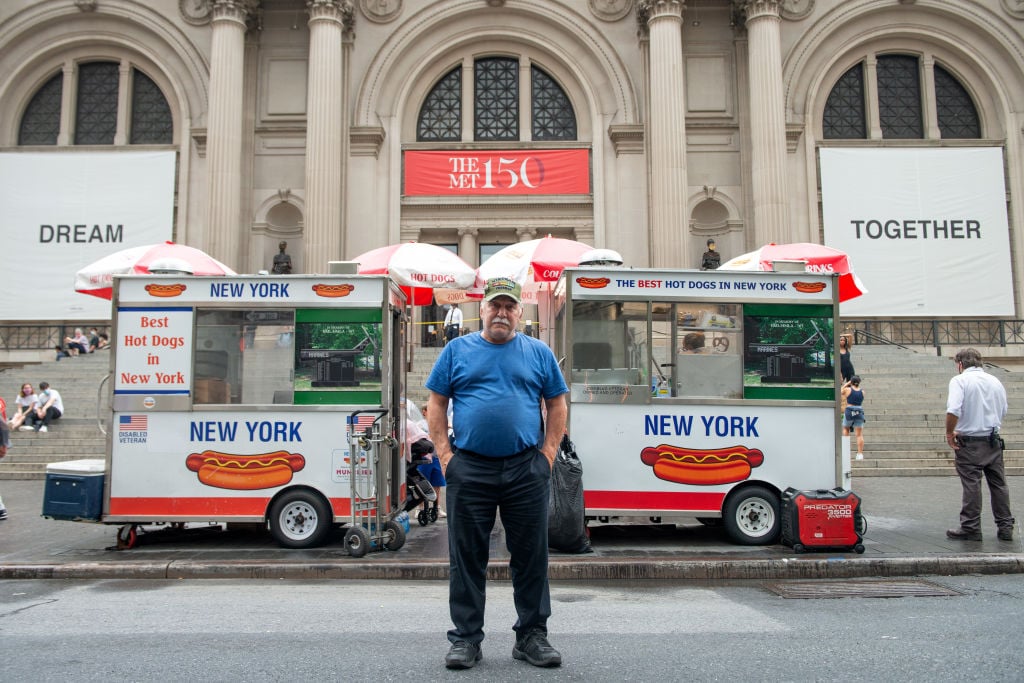
Dan Rossi, the man known as the New York “hot dog king,” has operated a food cart in front of the Metropolitan Museum of Art for more than a decade. But now he’s fighting to keep his signature spot—and he’s calling on you to help
In a new petition, which was launched by his daughter, the 73-year-old disabled veteran says that he’s facing repeated hectoring from health department officials and now risks losing his coveted spot in front of the Met’s famous steps. The city initially told him he could remain on his longstanding turf—which has been a source of fierce competition among vendors—but then “backtracked,” according to the petition, and is now requiring him to operate the cart 24/7 in order to stay.
As a result, he has had to sleep in his van every night to avoid being forced away from New York’s Museum Mile—even though he has the proper permits to be there.
“Because the health department has failed to enforce their own laws regarding illegal vending, my dad has been sleeping in his van for the last 11 years in order to protect his vending spot,” wrote Rossi’s daughter, Danielle Machado, in the petition. “Unlike many vendors on Fifth Avenue, my father has the legal permits required to operate a food cart.”
Machado explained that, “after being told [Rossi] could occupy his vending space in front of the Met, the health department backtracked on their statement. They’re now forcing him to work in his pushcart 24/7.”
“No other food cart owner is required to do this,” Machado said. “This is unfair!”
The petition calls on Mayor Eric Adams and health commissioner Ashwin Vasan to “enforce their health codes fairly across the board.” Started a month ago, it already has more than 32,000 signatures.
@nyhotdogs The Hot Dog King got shutdown! We knew it was only a matter of time before they started harassing us after his book came out and with all of the excitement and publicity from New York Nico’s post. They said he abandoned the carts. That is false. The carts were not abandoned. PLEASE SHARE THIS VIDEO! #nycfood #nyhotdogs #nytimes #munchies #netflix #hony #newyorknico #nyclife ♬ Hot Dog King – The Burner Band
It’s not a stretch to think that each of those endorsers has enjoyed one of Rossi’s famous frankfurters at some point. He started his food-cart business back in the 1980s and has been a staple on Manhattan’s streets ever since, hawking who-knows-how-many-thousands of dogs during that time.
Recent years—and Rossi’s resilience during the pandemic shutdowns, in particular—have only further established his status as a kind of cult hero. Media coverage has helped too: Since 2020, he has been profiled by numerous publications, including the New York Times, and just last year he appeared on the Netflix series Street Food USA.
Last fall, Rossi self-published a memoir, The New York Hot Dog King: From Rags to Riches to Less Than Rags. The book details his childhood in the Bronx and the two tours of duty in the Marines during the Vietnam war, among other early experiences. But the meat of the memoir takes place in the 1990s, when Rossi’s fight against then-real estate developer Donald Trump and Rudy Giuliani, who at that time were lobbying for a bill that would prevent disabled veterans from selling goods in midtown Manhattan, near the site of the Trump Tower.
“People ask how I became known as the hot dog guy who sleeps in my van to guard my hot dog cart in front of the Metropolitan Museum of Art but they don’t know me and how I got to this point,” Rossi said in a statement about his book in 2022. “What Trump and Giuliani are doing to this country is exactly what they did to me.”
“I was the one man who stood alone against money, power, and political influence,” Rossi added. “I saved the vets but I couldn’t save myself.”
When reached for comment about Rossi’s claims, a representative for the New York City Department of Health and Mental Hygiene said that “there is competition for prized vending spots” and the city does not “reserve” them.
“We have no interest in taking anyone’s place away,” the spokesperson went on. “However, people also can’t leave their carts unattended. Someone with a disabled veteran license must be present when a unit with a specialized disabled veteran permit is operating. When the next day of vending starts, if someone else sets up at the same spot, they are free to vend there if they have the appropriate permits.”